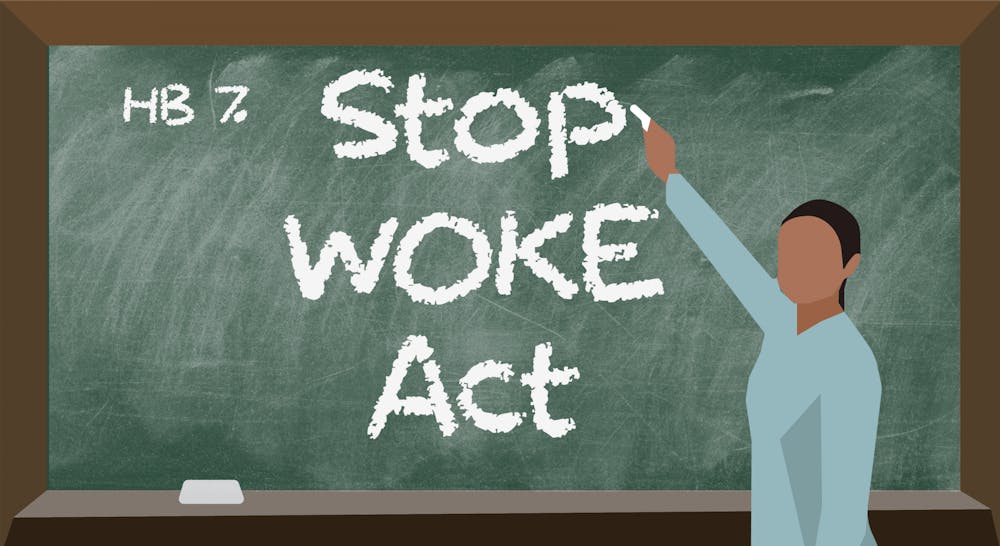A Florida judge’s decision to temporarily block parts of House Bill 7, also known as the Stop W.O.K.E. Act, Nov. 17 has UF students and faculty once again reflecting on the future of academic freedom.
The Stop W.O.K.E. Act was put in place in July. UF, the state’s flagship university, was the first to issue guidance to faculty, according to the United Faculty of Florida. It also has the most to lose financially from violations of the law because the university receives the most state funding.
Tallahassee U.S. District Judge Mark Walker issued the temporary injunction against HB-7 likening the act to something out of an Orwellian novel. If professors aren’t permitted to discuss challenging ideas, democracy will die in darkness, he said.
“The First Amendment does not permit the State of Florida to muzzle its university professors, impose its own orthodoxy of viewpoints and cast us all into the dark,” Walker wrote in his decision.
UF spokesperson Cynthia Roldan said the university doesn’t have anything to add about the decision.
The act prohibits public K-12 and university educators from teaching concepts such as one race being superior to another, that one should feel guilty for racism by their ancestors and races can be inherently privileged or marginalized.
Gov. Ron DeSantis championed the law as creating space for academic freedom within colleges, saying no student should be indoctrinated by ideas such as critical race theory — an academic concept that discusses systemic racism in the United States. His press secretary, Bryan Griffin, said they would appeal Nov. 17’s ruling.
Sarah Fishkin, a 19-year-old UF criminology junior, said after a teaching assistant wrote “critical race theory” on a whiteboard, her professor erased it without explanation, even though the topic was from a previous curriculum.
“It was just weird we couldn’t talk about it,” she said. “I’m glad the judge recognized that this act was taking away rights reserved to the schools and the people.”
UF history professor Jeffrey Adler said the law subjected UF to ridicule within higher education, given it restricted faculty from discussing a number of topics in the classroom.
A senior administrator in the College of Liberal Arts and Sciences dean's office told Adler and his colleagues not to use the phrase “social justice” in their classes, Adler said.
“To be frank, I can't do my job,” he said. “I literally cannot teach the history of race relations and the history of police brutality without talking about things that HB-7 prohibits.”
The state will fail UF graduates if the decision is reversed and HB-7 is enforced, Adler said, and UF students will be severely unprepared for post-collegiate education.
Academic freedom has been a continued issue the university has grappled with — most notably when three UF professors were barred from testifying in a voting rights lawsuit. UF eventually reversed its decision and prompted the university to change its conflicts of interest review policy, President Kent Fuchs told The Alligator.
UF President-elect Ben Sasse, who once taught history at the university level, addressed academic freedom and HB-7 at his Oct. 10 forum for faculty, sharing Adler’s sentiment.
Differing points of view and debates are essential to a well-rounded education, Sasse said.
“People who are opposed to indoctrination shouldn't be afraid of the fact that we want vigorous debate in our classrooms,” Sasse said.
It does a significant disservice to my students and places them at a disadvantage as they're launching their careers, he said.
Graduate Assistant United President Bryn Taylor said the act violated the First Amendment and endangered graduate assistants, who often assist with or lead certain academic courses. GAU sent teaching guides to graduate assistants to avoid violations or lawsuits.
“We’re happy that graduate assistants can now simply teach their classes without having to worry about being sued for simply sharing academic information,” she said.
Some students believe the state should have a say in Florida’s public universities, however.
Matt Turner, a 21-year-old UF music and economics senior, said some sections of the law, such as issuing restraints on private businesses, may go too far. But the law’s approach to public university curriculum is fair, he said.
“It makes sense that the state should be allowed to say certain things that they would like to be seen done because they receive funding from public universities,” he said.
The issues within the law can be addressed objectively without violating it, Turner said, and the only problem lies in teaching any ideology as truth.
The temporary injunction is a victory, UF history professor Paul Ortiz said, and he’s confident it will be upheld through an appeal. Ortiz thinks the act disenfranchises current students by reducing their post-graduate opportunities, he said.
“I don't think legislators in Tallahassee really care about that because they've already made their careers,” he said. “They're not thinking about the demands of the job market. They're not thinking about the competitive nature of getting into law or med school in the 21st century.”
Students at competing universities had an advantage over UF students because they have access to material UF students were barred from, Ortiz added.
Amanda Hiatt, a 19-year-old UF political science and women’s studies freshman, said her classes would be impossible to take without the inclusion of prohibited language under the law. The law is dangerous, she said, especially under Sasse, given his background in the Republican Party.“Honestly, in this political economy, it's terrifying,” she said. “It’s a genuine fear I have – having to switch paths entirely because of a bill that’s meant to silence a population of students who should be able to have their own thought processes.”
CORRECTION: This article has been updated to reflect that a senior administrator in the College of Liberal Arts and Sciences dean's office. The Alligator originally reported otherwise.
Christian Casale contributed to this report.
Contact Peyton at pharris@alligator.org. Follow her on Twitter @peytonlharris.

Peyton Harris is a third-year English major and Senior News Director for the Alligator. In her free time, she likes to doomscroll on Twitter and crochet.






